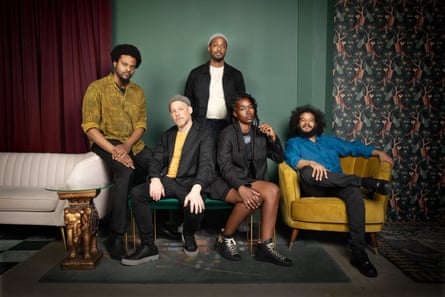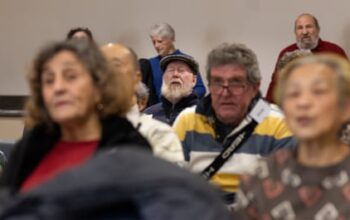‘T
The lingering effects of slavery cannot be erased simply by using bleach, constructing new buildings, or promoting diversity and representation. Moor Mother, also known as poet and musician Camae Ayewa, captures complete attention even through a video call. It becomes apparent within moments of speaking with her that her words are not meant to impress or entertain, but to speak the truth. In a previous interview with The Guardian, she boldly stated that society has not yet fully addressed the consequences of slavery, which garnered criticism from some. But, the question remains: have we truly dealt with these repercussions?
The interview took place in 2017. In recent years, the Black Lives Matter protests in 2020 have brought discussions about systemic racism and colonialism to the forefront of public attention. As a result, Ayewa’s thoughts on our slow recognition of the impact of the slave trade are no longer considered unconventional. However, her doubts are just as strong as they were seven years ago. She believes not much has changed and that the issue is simply being presented in a different, more modern way. While technology and the availability of information have increased, she feels that there is still a lack of action and pressure on governments to address these issues.
Ayewa’s latest album, The Great Bailout, details its criticisms of a specific target – Britain. Produced in partnership with the London Contemporary Orchestra, the album delves into the troubling history of British colonialism and their 1835 decision to compensate slave owners with a staggering sum of £20m (£17bn in today’s currency) following the legal abolition of slavery.
On the track “All of the Money,” Ayewa explores the history of colonial atrocities while a repeating question of “where did they acquire all the money?” echoes in the background. As she continues to ask the question, her voice becomes more distorted and the musical landscape becomes darker, creating a captivating experience that pushes the boundaries of what a song can convey emotionally. Ayewa reflects on touring the song with the London Contemporary and selling out every show, but expresses uncertainty about how it will be received when made available to a wider audience through streaming. She discusses society’s addiction to certain pleasures and sounds, and the pressure to conform to popular trends. This project serves as a reminder of the freedom that artists have to create whatever kind of album they desire, and the ability to use their platform to address important issues.
The song “Guilty” by Lonnie Holleyand Raia Was creates a haunting atmosphere for the whole album with its intricate layering of vocals, whispers, strings, and horns. Ayewa delves into the dark and ugly parts of history, posing important questions such as “Did you pay off the trauma? The horror? The whip of the sugar cane?” She also contributed to the Guardian’s Cotton Capital project, which explores the connections between the newspaper’s founders and their ownership of slaves. Her website encourages listeners to consider the fact that no enslaved individuals received any form of compensation, while her research reveals that two British prime ministers, William Ewart Gladstone and David Cameron, both had ancestors who received “compensation.”
The reason for this American artist’s focus on British history is questioned. According to Ayewa, being from Africa connects her to the UK and its history, and she is simply tracing her roots and struggles. She also shares that her last name, Dennis, is of English origin, prompting her to reflect on her identity and origins.
Ayewa, born in 1981 in Aberdeen, Maryland, was raised in a public housing project. From a young age, she was highly aware of political issues. She recalls being radicalized through learning about atrocities like the mistreatment of Indigenous peoples in America and the enslavement of African Americans. In third grade, she even expressed her frustration with the actions of Christopher Columbus.
Ayema’s curiosity for knowledge is reflected in their fascination with the experiences of Black individuals and African communities beyond the borders of the United States. Raised in an African Methodist Church, Ayema found empowerment in the word “African” and was always eager to connect with people from various African cultures. When someone from Jamaica visited their neighborhood, it was a thrilling event akin to a celebrity’s arrival.
Ayewa eventually relocated to Philadelphia to pursue a photography degree at the city’s Art Institute. She also used poetry as a form of journaling to express her thoughts on love and her frustrations. However, her favorite poets, Amiri Baraka, Maya Angelou, and Lucille Clifton passed away, which motivated her to continue their legacy. She values poetry as a healing tool, but acknowledges that not everyone has the ability to be a poet. She compares it to being a doctor, where simply knowing how to use a knife or words is not enough, it requires a different type of skill and craft.

She and her best friend Rebecca Roe came together to create the rap duo, Mighty Paradocs. Later, she joined saxophonist Keir Neuringer and bassist Luke Stewart to form Irreversible Entanglements, a free jazz group that incorporates activism into their music. Their unique sound is mesmerizing, creative, and revolutionary. Ayewa cites her love for artists such as Billie Holiday, Nina Simone, John Coltrane, and Saul Williams, who all align with their style.
In 2016, Moor Mother released her first solo album titled Fetish Bones, which combines elements of spoken word, hip-hop, and field recordings to explore themes of survival and resistance. She has since performed in a variety of settings, from intimate DIY spaces to prestigious stages like London’s Barbican. However, she does not identify with the label “the poet laureate of the apocalypse,” as it does not hold much meaning for her. In fact, she has never even used the word “apocalypse” in her poetry or music. Moor Mother also participates in the collective Black Quantum Futurism, which rejects the idea of an ending and focuses on the belief that life is a continuous journey.
Ayema’s unique style and storytelling in The Great Bailout serves as a powerful example of her revolutionary ideas and liberating political beliefs. She boldly declares, “I am committed to sharing the reality of the unknown and the events that have occurred. Someone must speak the truth.”
Source: theguardian.com


